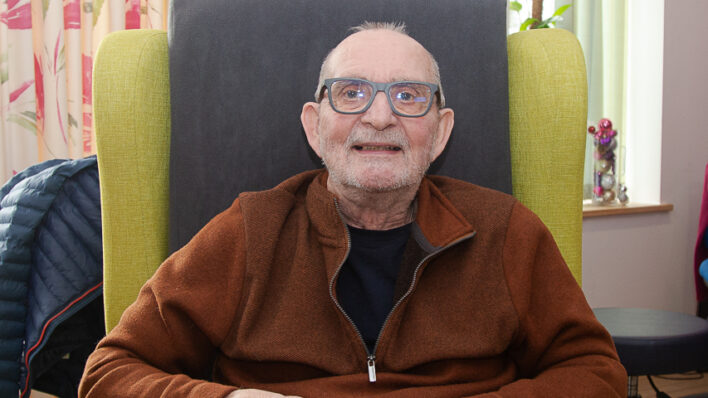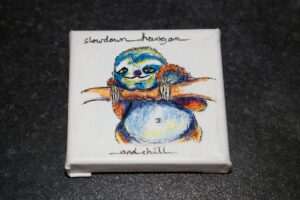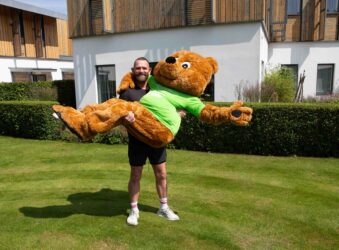Ray shares his Living Well experience
Share this story

Ray comes to the Living Well Service and took part in the canvas feedback project.
Ray kindly shared his story:
“Since I’ve had Motor Neurone Disease (MND), I’ve had to teach myself to slow down and to conserve my energy and rely on other people.
So, that was the idea behind the wording on the canvas. I used to love painting watercolour, but I’ve found it physically harder to do recently. So I’ve been painting, mostly animals, in little squares for greetings cards. My canvas is of of a sloth – because it’s slow – like I am now.”

I’ve always been very active and was still working until just after my diagnosis. Before I became ill, my idea of chilling out was to do something active. So, I’ve had to force myself to slow down and take it easy. It’s easy enough to do I think, as long as you live in the moment.
My wife and I were talking on the way here today. She said “What do you want to do for your birthday? Would you like to visit somewhere we used to go?” I used to walk a lot but I’m happy not going out now. I try different things and try being in the moment, making sure I’m doing what I want to and what I’m able to do. I try not to dwell too much on the past – if you dwell too much on the past, you’ll just spiral down.
I’m very fond of the people I’ve met here at Living Well. Coming here gives me quite a warm feeling, I think. So, I’d recommend it to anybody and in fact we have recommended it to people in similar positions to me. I think when you are very active and busy, you talk to people, and you communicate with people but not for very long. When you’re diagnosed with something that’s life limiting and come to somewhere like Arthur Rank Hospice Charity, you can sit around and talk to people, that you’ve never met before and you can listen to their stories and share you’re own, which I find very supportive and interesting.
The other good thing we’ve found is being able to talk about the future. It feels like it would be scary to talk about dying but it isn’t. It set our mind at rest to be able to plan how the end might look and what I want and don’t want to happen. It’s very reassuring to know that my wishes will be taken into account. We were able to talk about it calmly because we didn’t wait until I was in crisis. It was good to talk all this through with Niki [my wife]. I know now I can go forward without trepidation.”
Our ‘Outstanding’ services are provided free of charge to patients and their families. Our aim being to provide the highest quality care, helping people to make every moment count. You can find out more about how we are funded here: arhc.org.uk/how-we-are-funded.
View other stories
-

Friends walk for Sherrall at Star Shine Night Walk 2025
A group of 18 friends from Royston walk in memory of Motor Neurone Disease Patient, Sherrall
-

Hospice supporter takes on Hyrox challenge in memory of his Coach
Ben Blowes will be taking on 31 Hyrox Challenges in 31 days
-

G Webb Haulage take to the skies for Arthur Rank Hospice Charity
Fifteen courageous members of the team raised an incredible £16,249 for the Charity
-

Cultural Beliefs observed by Hospice at Home Team
Ali passed away peacefully and pain free at home




